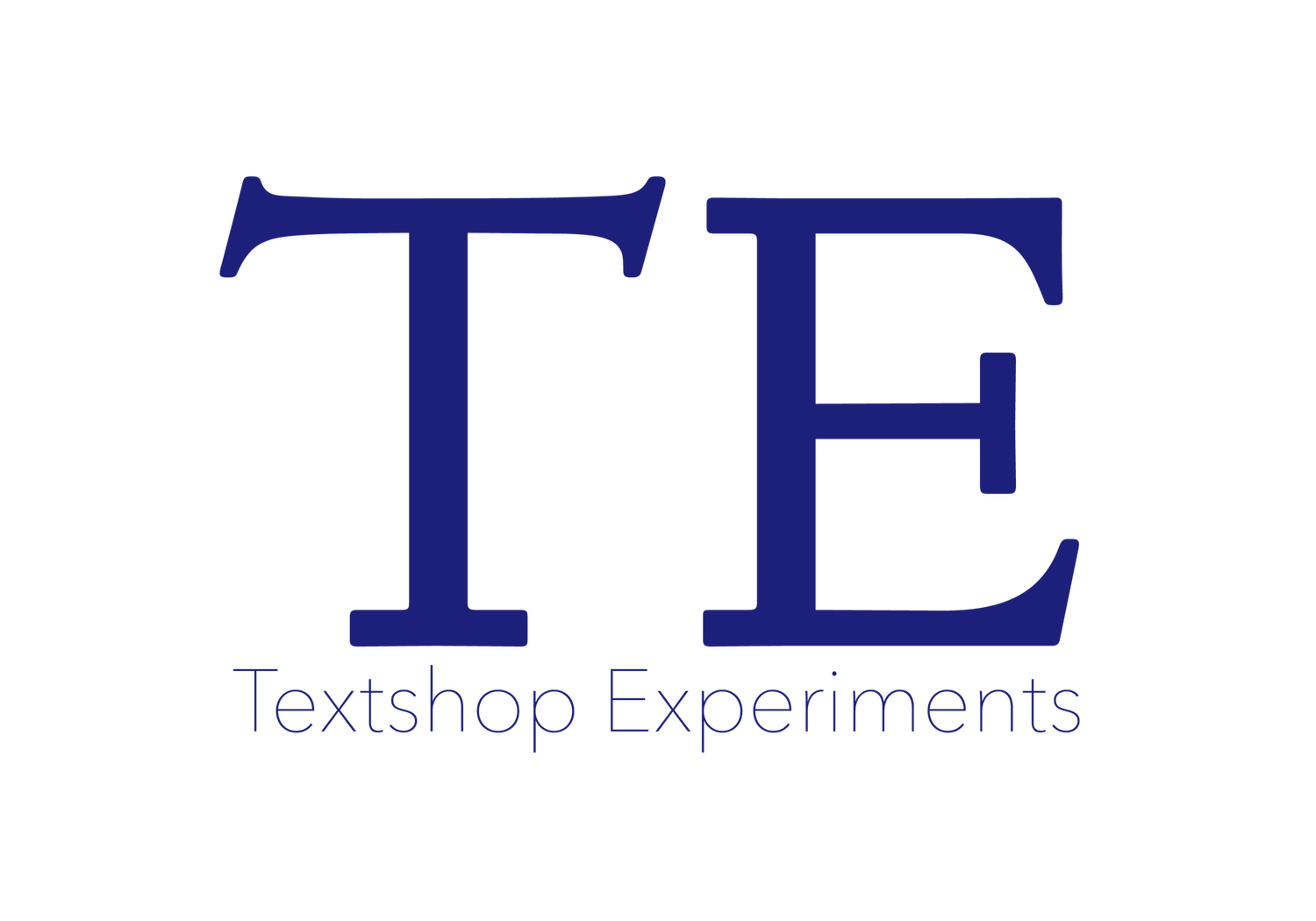The Projector Finds a Hobby
K. A. Wisniewski
K. A. Wisniewski is one of the Founding Editors of Textshop Experiments. He has taught English, History, and the Visual Arts at Widener University, Stevenson University, and UMBC. His research interests include poetry and poetics, comedy and satire, the history of printing and publishing, and the future of the book. The author of Making Faces (2016), Wisniewski is the editor of The Comedy of Dave Chappelle: Critical Essays (2009) and a critical edition of A Pretty Story by Francis Hopkinson (forthcoming 2018). His latest work is forthcoming in the anthologies Planned Obsolescence: Texts, Theory, Technology and The Beauty of Letters: Text, Type and Communication in the Eighteenth Century. He is currently completing a translation of surrealist Marcel Lecomte's poetry.
Creator's Statement
The premise of this experiment is grounded by two manuals published by Gregory L. Ulmer: "Handbook for a Theory Hobby" (1989) and "Theory Hobby: 'How-to Theory'" (1990). It is an exercise working towards making theory (fun) and is guided by Ulmer's own models, although this exercise clearly diverts from Ulmer's strategies. Like Ulmer, it demonstrates how we might construct popular theory, by functioning as craft. However, here, the allegorical components—such as his botanical rhizome—are seemingly replaced with the literal—paper—although in "Handbook" Ulmer himself notes,
STEP FOUR
Consider the fact that paper is made from trees. Note the saying: "three books are as good as a fire."
Although GLU suggests that participants address "the problem of a writing without paper," it is topic from which my own life and work cannot escape. In conducting this experiment, I see that, as Jacques Derrida writes in his essay "Paper or Me, You Know",
I have the impression (the impression!—what a word already) that I have never had any other subject: basically, paper, paper, paper. (41)
Even the most inextricably digital projects remain tied to or haunted by questions and memories of paper: the fixity of the words on the paper, the threat of its material deterioration, and the shifting rules and structures that moderate, govern, restrict and liberate . . . I approach the work via persona of the Projector, the schemer, the speculator, the innovator, the entrepreneur, the teacher, and the pseudonym donned by Samuel Johnson, Joseph Addison, Daniel Defoe, and Jonathan Swift. In the long-standing quarrels between the Ancients and Moderns, I wonder if the Futurists might be posed as a third option. Although this question might be posed in another installment, I cannot resist here to ask how this group might read this experiment. In one future, those conducting their own experiments in electrate invention will read the act of paper-making as metaphor. In another future, the process appeases our nostalgia for a print-oriented culture. In the first scene, we have redefined literature and scholarship; in the other, the genius is in the archive. Other futures are yet to unfold.
The results of this experiment expose the haunting nature of paper. The Ulmer text (which I transcribed, essentially reassembled for his 2015 collection Electracy) is (literally) recycled here: marked and torn, soaked and blended, and embedded in a new set of paper. Instead of a printed manual, the video mimics the ubiquitous online, step-by-step, DIY tutorial. The audio tracks overlaid on the video is a montage of past recordings never intended for publication. They are personal and professional clips from past lectures, conference papers, group seminars and personal memos from this past year. While parts of the introduction and many of the presented papers themselves were clearly scripted, most were plucked from their original context: my found "objects." I replace "lessons" and "steps" with "scenes" to evoke the performative, theatrical nature of the work (ahead). Just as I am haunted by paper itself, I, too, am coming to terms with these (my) voices, ideas, working "papers", and place these around [INTERMISSION] the aural apparitions of the scholars I am working with, on, upon, towards . . . This demonstration intends to re-imagine alternative (future) histories for writing practices. It attempts to negotiate the features associated with orality, manuscript, print, and electronic modes.
Haunted by both the powers of print and rotting of the rag. Here, the Projector Finds a Hobby.
Works Consulted
Defoe, Daniel. An Essay Upon Projects. R.R. for Tho. Cockerill, 1697.
Derrida, Jacques. Paper Machine. Translated by Rachel Bowlby. Stanford University Press, 2005.
"Derrida 'on Technology' with Raymond Williams." YouTube, uploaded by Gnana Sekaran, 15 Mar. 2013, https://www.youtube.com/watch?v=lqCEAOeScXw.
"Jacques Derrida: Fear of Writing." YouTube, uploaded by jmettes, 23 Aug. 2006, https://www.youtube.com/watch?v=qoKnzsiR6Ss.
"Jacques Derrida / Paul de Man." YouTube, uploaded by Yuji Nishiyama, 16 Aug. 2013, https://www.youtube.com/watch?v=WxER4IcTBws.
"Marshall McLuhan Full Lecture: The Medium is the Message 1977." YouTube, uploaded by mywebcowtube, 9 Aug. 2011, https://www.youtube.com/watch?v=ImaH51F4HBw.
McLuhan, Marshall. Understanding Media. MIT Press, 1994.
Novak, Maximillian E., editor. The Age of Projects. University of Toronto Press, 2008.
Ong, Walter. Orality and Literacy. Routledge, 2002.
"Robert Darnton: The Case for Books." YouTube, uploaded by WGBHForum, 26 Nov. 2012, https://www.youtube.com/watch?v=E10hbZXHHm4.
Saper, Craig. Networked Art. University of Minnesota Press, 2001.
Swift, Jonathan. Gulliver's Travels. Bickers & Son, 1883.
- - -. A Tale of a Tub and Other Works, edited by Angus Ross and David Woolley. Oxford University Press, 2008.
"The Third Pill - Slavoj Zizek." YouTube, uploaded by Armenian Alchemist, 3 Jan. 2016, https://www.youtube.com/watch?v=d3bBreSgaik.
Treadwell, J. M. "Jonathan Swift: The Satirist as Projector." Texas Studies in Literature and Language, vol. 17, no. 2, 1975, pp. 439-460.
Ulmer, Gregory. “Handbook for a Hobby Theory.” Electracy: Gregory L. Ulmer’s Textshop Experiments, edited by Craig Saper, Victor Vitanza, and Gregory Ulmer, The Davies Group Publishers, 2015, pp. 287-300.
- - -. Heuretics: The Logic of Invention. Johns Hopkins University Press, 1994.
- - -. "Theory Hobby: 'How-to Theory.'" Art and Text, vol. 37, 1990, pp. 96-101.
"Ulmer Tapes 01.08." YouTube, uploaded by John Craig Freeman, 10 Sept. 2010, https://www.youtube.com/watch?v=YjXHf7qJrM8.
"Ulmer Tapes 02.02." YouTube, uploaded by John Craig Freeman, 10 Sept. 2010, https://www.youtube.com/watch?v=sQuHoOso_2o.

